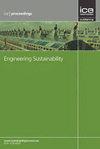为大型基础设施项目创造长期社会价值:个案研究
IF 1.5
4区 工程技术
Q3 ENGINEERING, CIVIL
Proceedings of the Institution of Civil Engineers-Engineering Sustainability
Pub Date : 2022-04-22
DOI:10.1680/jensu.21.00082
引用次数: 4
摘要
基础设施项目有责任和义务创造比通过建设资产获得的核心效益更广泛的社会价值。人们已经认识到,在资产的采购和建设中,应该创造社会价值机会,以响应项目所在地的需求。然而,衡量大型基础设施项目的社会价值是具有挑战性的,因为项目会给社会的不同领域带来巨大的变化。许多这些变化都没有被负责基础设施项目的组织或社会上的其他人记录下来。此外,社会价值测量研究通常是在项目已经进行或甚至完成时委托进行的,这可能意味着没有建立适当收集所需输入数据以量化和评估社会影响的机制,而到那时,这样做通常为时已晚。本文概述了创建实现社会价值框架的最佳实践方法,并以Tideway公司为例,分享了他们在创造社会价值方面的经验教训。Tideway公司负责英国伦敦的泰晤士潮汐隧道项目。本文章由计算机程序翻译,如有差异,请以英文原文为准。
Creating long term social value on major infrastructure projects: a case study
Infrastructure projects have a duty and obligation to create social value that is broader than the core benefits achieved through construction of the asset. It has been recognised that in the procurement and construction of the asset, social value opportunities should be created that respond to the needs of the project location. However, measuring social value for large infrastructure projects is challenging because of the sheer number of changes in different areas of society as a result of the project. Many of these changes go unrecorded by the organisation in charge of the infrastructure project or anyone else in society. Furthermore, social value measurement studies are often commissioned when the project is already well underway or even completed, which can mean that mechanisms to properly collect the required input data to quantify and value social impact was not set up, and by that point it is usually too late to do so. This paper outlines best practice methodology in creating a framework to achieve social value, using Tideway, the company delivering the Thames Tideway Tunnel project in London, UK, as a case study to share lessons learnt from their approach to social value creation.
求助全文
通过发布文献求助,成功后即可免费获取论文全文。
去求助
来源期刊

Proceedings of the Institution of Civil Engineers-Engineering Sustainability
ENGINEERING, CIVIL-ENGINEERING, CIVIL
CiteScore
3.70
自引率
16.70%
发文量
44
审稿时长
>12 weeks
期刊介绍:
Engineering Sustainability provides a forum for sharing the latest thinking from research and practice, and increasingly is presenting the ''how to'' of engineering a resilient future. The journal features refereed papers and shorter articles relating to the pursuit and implementation of sustainability principles through engineering planning, design and application. The tensions between and integration of social, economic and environmental considerations within such schemes are of particular relevance. Methodologies for assessing sustainability, policy issues, education and corporate responsibility will also be included. The aims will be met primarily by providing papers and briefing notes (including case histories and best practice guidance) of use to decision-makers, practitioners, researchers and students.
 求助内容:
求助内容: 应助结果提醒方式:
应助结果提醒方式:


